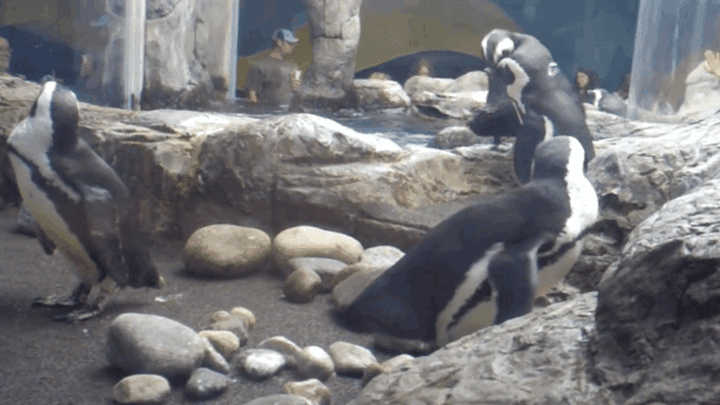Some Penguins Are Projectile Poopers
By Mark Mancini

These Antarctic birds might look cute and huggable, but you might want to give them a wide berth after mealtime. We’d recommend a distance greater than 16 inches.
When Chinstrap (Pygoscelis antarctica) and Adelie (Pygoscelis adelie) penguins poop, things can get explosive. The dichromatic divers are capable of launching their fecal matter up to 40 centimeters—or 15.75 inches—away. Here’s a captive Adelie penguin showing off this scatological talent at the Ripley’s Believe it or Not! Aquarium in Gatlinburg, Tennessee:
In a 2003 paper—delightfully titled “Pressures produced when penguins pooh—calculations on avian defaecation”—authors Victor Benno Meyer-Rochow and Jozsef Gal looked at how these birds egest so dramatically.
Meyer-Rochow said it was his students at Jacobs University in Bremen, Germany that inspired him to pursue the study. After he showed his students a poop-lined nest, one asked how the penguins did it. "They get up, move to the edge of the nest, turn around, bend over and shoot," he told her, recounting to The Guardian, “The student who had asked the question, she blushed. The audience chuckled, and we got the idea to calculate what pressure is produced by a penguin’s pooh.”
Gal and Meyer-Rochow wanted to determine how hard the animals clench certain muscles in order to generate fecal liftoff. But rather than examine live specimens, they relied on photographs of pooping Adelies. Like all birds, they defecate through an opening called the cloaca. The dimensions of the cloaca proved vital to the scientist’s calculations—as did knowing the surface stickiness of Adelie dung.
By taking both factors into account, they were able to deduce that the cloaca’s internal launch pressure reaches as much as 600 grams per square centimeter—three times more than what humans generate when going number two. "The forces involved," the scientists wrote, "lying well above those known for humans, are high, but do not lead to an energetically wasteful turbulent flow. Whether a bird chooses the direction into which it decides to expel its faeces, and what role the wind plays in this, remain unknown."
The reason this special talent evolved in the first place comes down to cleanliness. Unguarded nests are, as a rule, vulnerable, so penguin parents are reluctant to leave their eggs alone, even momentarily. But they also don't want a messy nest. So when nature calls, an Adelie or Chinstrap will bend down, aim its rump away from the clutch, and fire away.